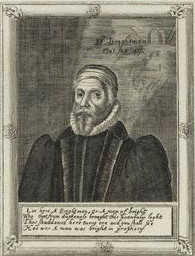Thomas Brightman
| Thomas Brightman | |
|---|---|
 |
|
| Born | 1562 Nottingham, England |
| Died | (aged 44/45) |
| Nationality | English |
| Alma mater | Queens' College, Cambridge |
| Occupation | Clergyman and biblical commentator |
Thomas Brightman (1562–1607) was an English clergyman and biblical commentator. His exegesis of the Book of Revelation, published posthumously, proved influential. According to William M. Lamont, Brightman and Joseph Mede were the two most important “revisionists” of the interpretation and eschatology set down by John Foxe; among Brightman's contributions was to weaken the imperial associations tied to the Emperor Constantine I. The detailed reading, in favour of the Genevan and Scottish churches, and condemning the 'Laodicean' (lukewarm) Church of England, helped to move on the Puritan conceptions of church reform and its urgency.
Brightman was born at Nottingham, and admitted a pensioner at Queens' College, Cambridge, in 1576, where he became Fellow in 1584. He graduated B.A. in 1581, M.A. in 1584, B.D, in 1591. In 1592. on the recommendation of William Whitaker, Sir John Osborne gave him the rectory of Hawnes in Bedfordshire. Brightman frequently discussed in his college church ceremonies with George Meriton, afterwards dean of York. As a preacher he was celebrated, though his disaffection from the church establishment was no secret. It is said that he subscribed the Book of Discipline.
His life, says Thomas Fuller, was most angelical. He used always to carry about a Greek testament, which he read over every two weeks.
Riding on a coach with Sir John Osborne, and reading a book (for he would lose no time), he fainted, and died, on 24 August 1607. He was buried, according to the parish register, on the day of his death at Hawnes. There is an inscription to him in the chancel. He was never married. His funeral sermon was preached by Edward Bulkley, D.D., sometime fellow of St. John's College, Cambridge, and rector of Odell in Bedfordshire.
...
Wikipedia
